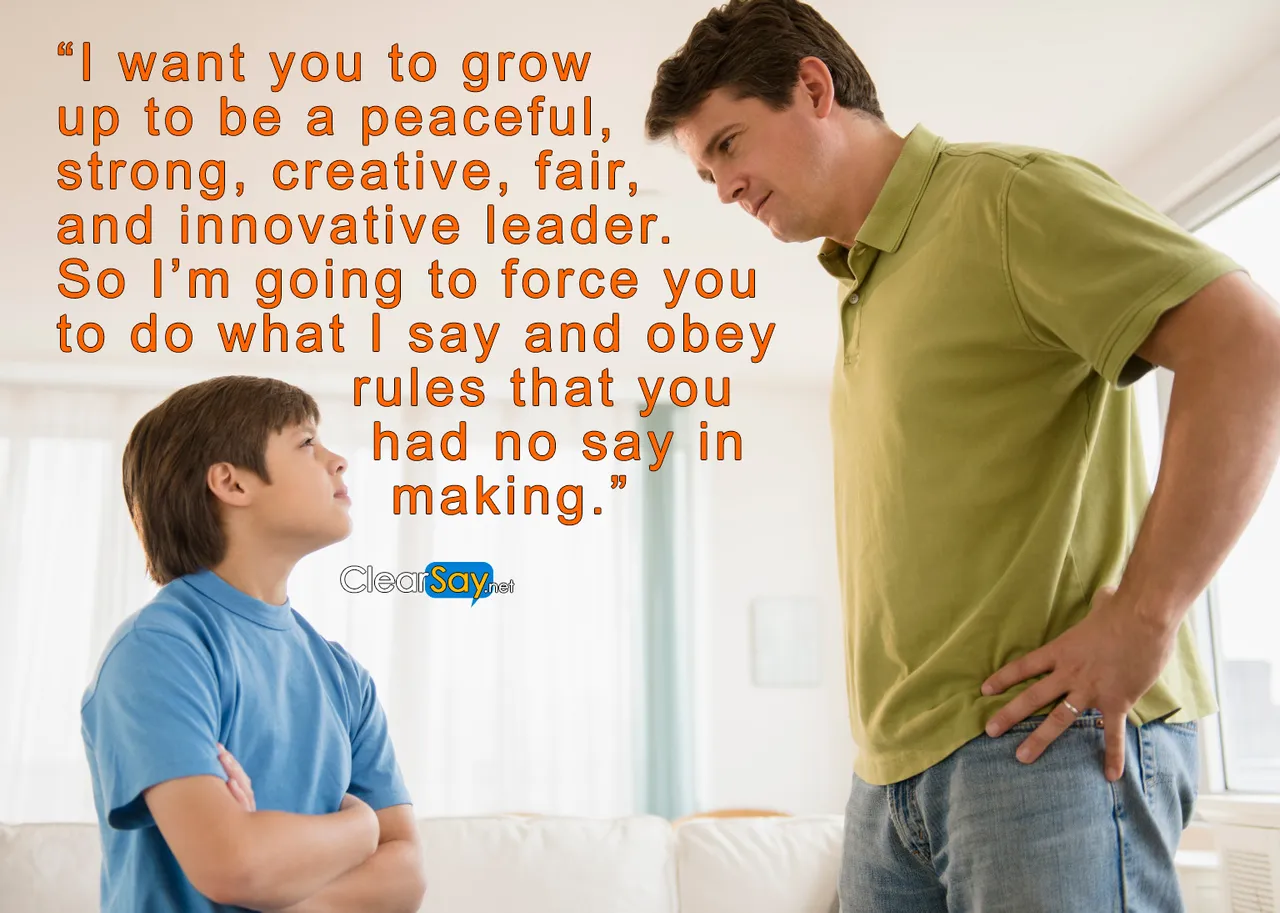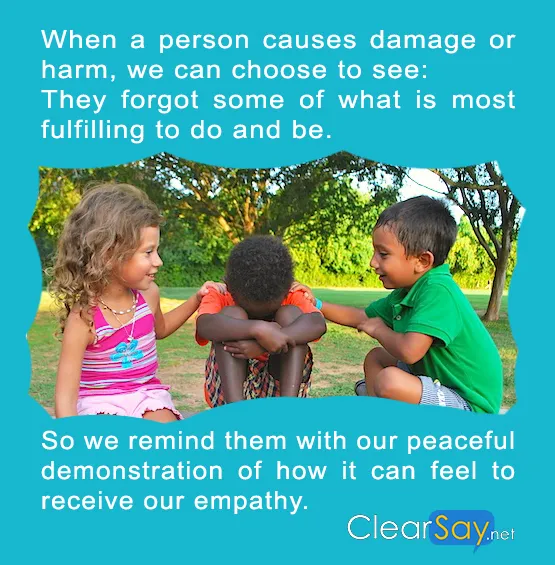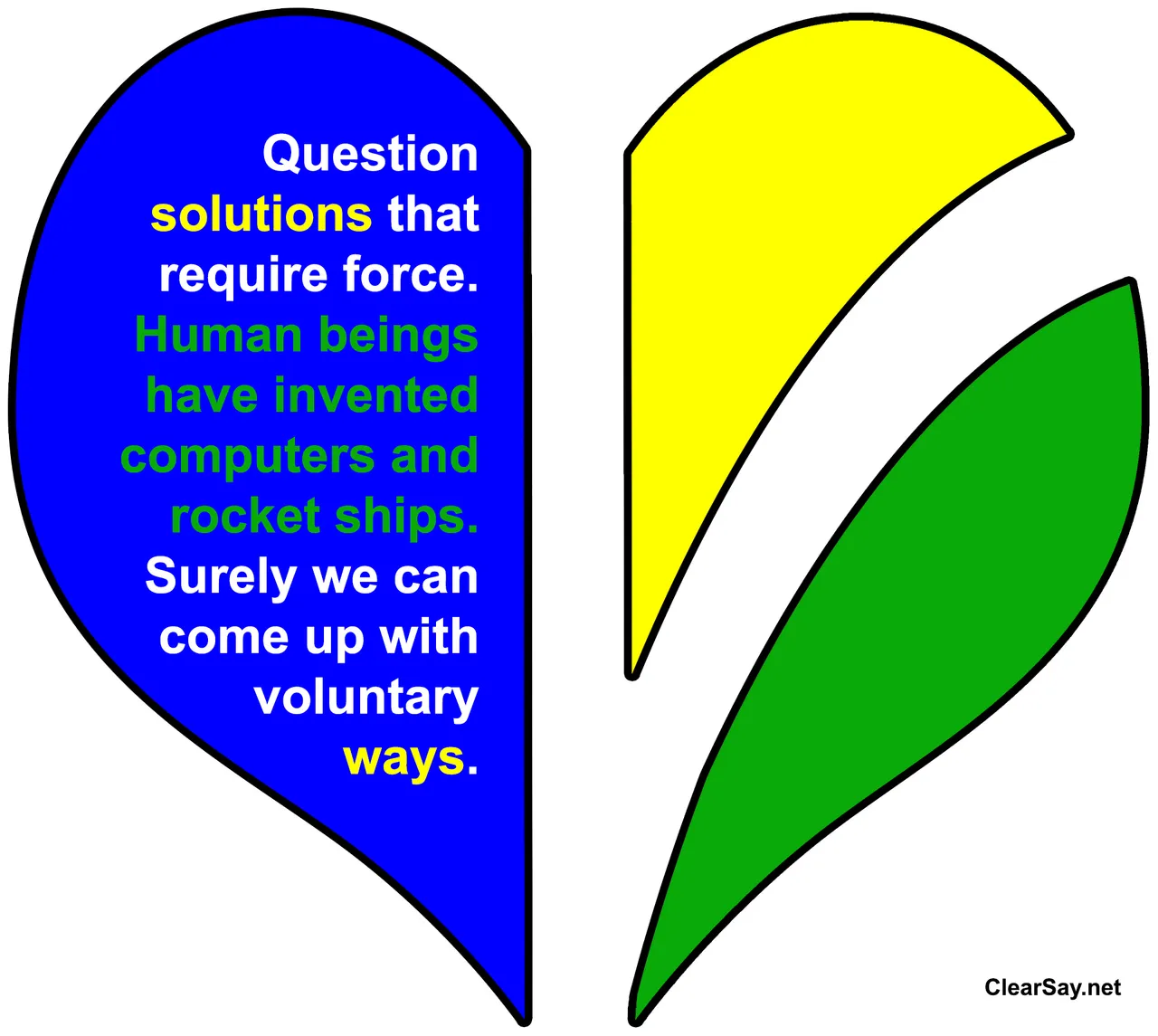
Home life is where the foundation of peace, prosperity, health, and freedom must be built by parents committed to their children becoming functional adults who are inspired and able to do more than survive.
Coercion leads to coercion
How parents treat their children teaches children a great deal about human relations.
How children are treated makes the difference between an Adolf Hitler and a Mother Teresa. There is no excuse for violence in the home, where children thrive in an atmosphere of love and safety.

Children are easily misunderstood, and parents are quick to set unreasonable expectations for their children. This leads to conflict and heartache instead of peace and love. Parents who are mean and violent are teaching children how to be mean and violent towards other human beings, and when these children do as they've been shown, they're labeled as bullies and deviants.

Peaceful parenting
Then there are parents who treat their children like fellow human beings, having dignity, deserving of respect, and acknowledged as simply ignorant about life grow up to thrive and flourish through life's many challenges.

It's a commitment to nonviolence; a commitment to as many interactions as possible being mutually consentual in nature. What do I mean by this? First, I'll share about what it is not.
What is permissive parenting?
This is where a parent expends energy and resources to meet every desire and solve all problems their children may have, as well as protect them from everything from disappointment to boredom to discomfort to heartache to pain. That is an environment that reinforces dependency. This child - used to being handled in such a manner - will find the "adult world" to be confusing, scary, and overwhelming.
Jonathan Haidt, social psychologist, TED speaker, Professor of Ethical Leadership at New York University, and author of The Coddling of the American Mind: How Good Intentions and Bad Ideas Are Setting Up a Generation for Failure, posits that it was in the 1980's we can see the beginning of a convergence of factors contributing to this kind of parenting:
- People began having less children, which drove up parents' "per child value," as in if you only have one child to lose, you may put more effort into protecting that child than if you had two or three. Protection from immediately obvious dangers was expanded to become protection from disappointment, boredom, discomfort, etc.
- Mainstream media increasingly exaggerates violence to exacerbate fear of strangers.
- On average, people raised before the 1980's spent much more time unsupervised.
These factors lead to a severe lack of what Haidt calls "hardship innoculation."
To that list, I want to add lack of parental empathy.
What? Most parents love their children and feel empathy for them!
A very specific kind of empathy is missing
Yes, they may feel it but how often do they speak empathy to their children?
What does this "empathy speak" sound like?
There are many models for expressing empathy verbally. Nonviolent Communication (NVC) is the one I prefer and will illustrate here.
Child: "Mommy I want to go to Disneyland!"
Mom (no empathy shown): "Sorry, honey. We can't afford it."
Mom (using NVC-style empathy): "Are you imagining what it would be like to be at Disneyland? Is it the excitement of the rides, the variety of colors and characters from cartoons you like, or the playful nature of the place?"
Here the mother has come at the situation with an attitude of curiosity. This can still lead to a "no". But there are some big differences here. One is that the parent is using the child's question to learn more about their child on a deeper level.
But wait, there's more!
The parent using this empathetic approach is going to find out the feelings and needs underlying the strategy. What do I mean by that? Strategies are what we do in order to get our needs met and feelings signal us that a need is getting met or not. In this case, the strategy is "going to Disneyland". When the child and parent become aware of the underlying feelings and needs, other strategies to meet those needs become visible.
Note that NVC-style "needs" are not life or death needs like air, water, food, and shelter. They are more like wants and desires. Optimally, we can find strategies that meet the needs of all who are involved, rather than one person or the other compromising or sacrificing their needs in order to meet the needs of the other.
Child: "Yes, mommy, play! And other kids."
Mom: "Ahhh! Are you feeling a bit lonely because you want connection and play with other kids?"
Child: "Yes, mommy! I want more friends to play with."
Here, the mom stuck to focusing on feelings and needs until she got to the underlying issue. See how this may have never been discovered if the parent had merely answered with "Sorry, honey. We can't afford it"?
Continuing the conversation
Child: "So can we go to Disneyland?"
Mom: "I hear you that you want more connection and play. Disneyland is one way to meet those needs. I have a certain amount of money that I want to use to buy food and put gas in the car, which meets my needs for nurturing us. I wonder if there are other activities you or we can do to meet your needs for connection and play?"
Here the mom has - after making sure she "got" the child's needs - expressed her own. The child is learning the language of feelings and needs, how to recognize and respect the feelings and needs of others, and even something about resource management.
How does this translate into a child growing up to be more effective at life?
A child whose needs are recognized (not necessarily met or solved in the way proposed by the child) by the parent will have many advantages. One is a sense of responsibility; a general feeling of power over one's life. How? Notice when the child expresses the desire to go to Disneyland and the empathetic parent's language is more in the realm of "You want this for these understandable reasons (loneliness, connection, play) and I bet you (or - if necessary - we) can find other ways to meet those needs," than "You want this and I (the authority figure) am going to either solve it for you or veto it."
Another example: Which of the following is more empathetic?
Child: "Mommy the things that boy said to me hurt my feelings!"
(a) "That boy was wrong. He's mean. Ignore him!"
(b) "Oh my sweet baby! Let's get you some ice cream and a toy!"
(c) "What did you say or do to him?"
(d) "Are you sad because it hurts to hear things like that and you want more consideration for your feelings?" After empathy for your child, maybe even progressing to encouraging empathy for others with something like, "I wonder why that boy is hurting so much he says things like that to other people?"
Your feelings don't matter
"Stop crying. Calm down. Knock it off. You're fine. There's nothing wrong with you. Be quiet. Shut your mouth and do what I told you to do. You'll get over it." Or distractions like "Look at this. Eat this. I'll give you this. If you are good, you can have a treat!"
These are examples of common (and accepted by the majority/mainstream) ways people (parents, teachers, etc.) speak to children in our culture. Can you think of a worse way to teach our children to distrust their own feelings?
Remember, these experiences teach kids how to deal with other people, so the odds are high these are the kind of responses your child will later give others when those others are struggling to express "unacceptable" emotions or needs.
This usually comes from a sincere desire on the parent's part to minimize their child's suffering. For most of us, it hurts to see another person in pain, especially our children. So it is much easier to overlook the long term damage that occurs when we choose the short term fixes that ignore a child's needs to have autonomy, be heard, understood, accepted, and respected. Especially when those short term fixes seem cheaper in terms of time and energy expenditure because the quick command requires little time or thinking and we might see an immediate payoff, assuming the child does not immediately rebel. But whether we get the short term results we want or not, the long term price is high.

The other extreme: Authoritarian parenting
Perhaps surprisingly, authoritarian parenting has many similarities to permissive parenting, including:
- Reducing a child's agency by making choices for them and/or limiting their actions based on fear that they will "misbehave" or get hurt or damaged.
- Punishment or reward as a reaction to a child expressing a feeling or need that stimulates certain feelings in a parent. More about punishment by @brightstar: @brightstar/the-obsession-with-punishment.
- Creating dependency by reinforcing roles of authority vs. sub-human, rather than encouraging independence by allowing a child to make mistakes and learn lessons.
More I've written on the overall topic:
@scottermonkey/tantrums-aren-t-what-you-think-they-are